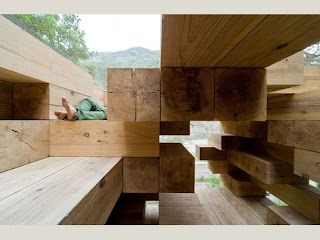I have just read a
paper on the structure of a 4th and 5th year architecture degree dealing with
immateriality in architecture . Allot of this mirrors ideas Im exploring this
semester as well as past semesters. I also found a bit of clarity to my ideas
and some structure for investigating them in this paper.
*Hadjichristou, M
& Y. April 2012. EPOKA
University, department of Architecture. Living
where the immaterial matters; (unit 2, year 4th and 5th).
www.icaud.epoka.edu.al. Viewed 18.9.12
-Immaterial qualities
of architecture: Movement and Pause, Rhythm, notions of time, void and mass,
sequence of spaces and fluidity.
*Flows and buildings
are interwoven into the unified urban entity.
*The Japanese notion
of “Ma”: gap, void, pause, movement, special perception
-Look at the
relationships between, time and space, senses and atmospheres, light and
darkness. Strategy- design for atmospheres and environments.
Dualities worth investigating: tactile-
immaterial, tectonic- atmospheric, unexpected- familiar, fragmented- whole,
spontaneous- planned, aging- evanescent,
-Boundary conditions-
boundaries and thresholds, grey zones of crossing limits, edges of different
entities,
Look into: the envelope of the building and its surroundings, the treatment of
surfaces and materiality, public and private relations, void/ mass and in between,
programmatic requirements and non-functional space.
One notion I find
really interesting is Fluidity= the flow of users to site, Paddington, city.
Architecture as a system of flows not an object.
-The notion of
entrance, explore as a malleable element, capable of transformation. (E.g linear
traditional, network, non controlled open public entrance, unexpected entrance
, explorative journey to enter)
Another important
element is Mobility in the architecture and the urban environment. The flow of Paddington
interwoven with the building; a new flexible living relationship.
Change in response to constant
change needed by the urban user. Scenarios of temporary habitation and permanent
habitation in relation to special need or event.
one of my favourite buildings of all time is an example of some of these qualities notably the relationship void and mass. Such a stunning resolution
www.worldbuildingsdirectory.com/project.cfm?id=1035 viewed 19/9/12





No comments:
Post a Comment